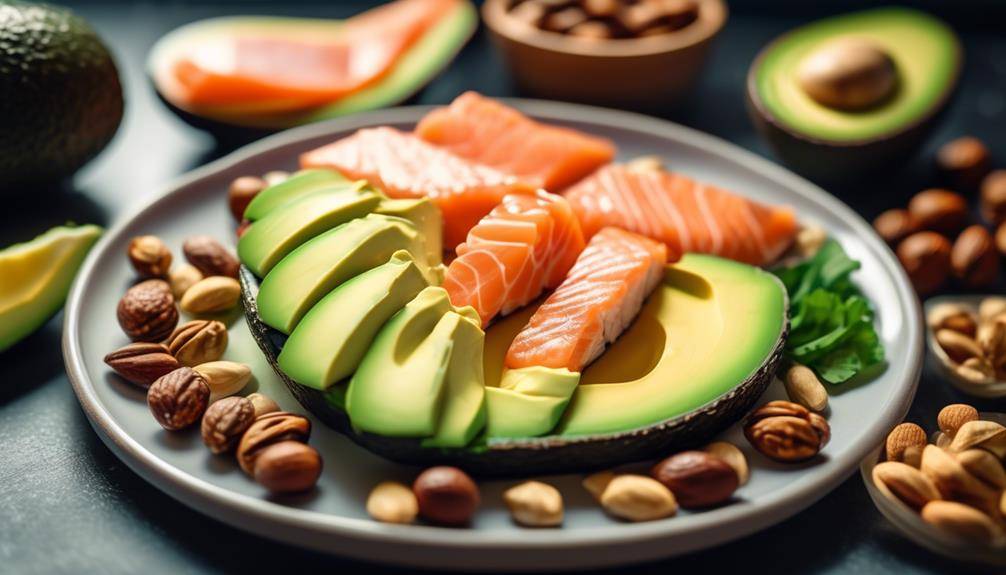Popular Ketogenic Diet Principles and Cholesterol

Curious about the connection between Ketogenic Diet Principles and Cholesterol? Wondering whether this popular eating plan could have any impact on your cholesterol levels? Well, buckle up and prepare to explore the fascinating world of the ketogenic diet and its potential effects on your cholesterol profile. While some may tout the benefits of this low-carb, high-fat diet, others have concerns about its impact on heart health. So, let’s dive into the science and uncover the truth behind the ketogenic diet and cholesterol.
What Is the Ketogenic Diet?
The ketogenic diet is a low-carbohydrate, high-fat eating plan that has gained popularity for its potential benefits in weight loss and improving overall health. The diet works by shifting your body’s primary fuel source from carbohydrates to fats. By drastically reducing your carbohydrate intake and increasing your fat intake, your body enters a metabolic state called ketosis.
In ketosis, your body starts using fat as its main source of fuel instead of glucose. This shift in fuel source has several benefits. First, it can help with weight loss. When you consume fewer carbohydrates, your body is forced to burn fat for energy, leading to weight loss. Additionally, the high fat content in the ketogenic diet helps you feel more satisfied and reduces hunger cravings, making it easier to stick to the diet and maintain a calorie deficit.
Beyond weight loss, the ketogenic diet has several other potential benefits. It has been shown to improve insulin sensitivity, which is important for managing blood sugar levels and preventing type 2 diabetes. The diet may also help reduce inflammation in the body, which is linked to various chronic diseases. Some studies suggest that the ketogenic diet may improve brain health and cognitive function, although more research is needed to fully understand these effects.
How Does the Keto Diet Work?
So, how does the keto diet work? The keto diet works by inducing a state of ketosis in your body, where it burns fat for fuel instead of carbohydrates. By severely limiting your carbohydrate intake and increasing your fat consumption, your body is forced to rely on stored fat for energy, leading to weight loss. This shift in fuel source can also have an impact on cholesterol levels, with some studies suggesting that the keto diet may help improve cholesterol profiles by increasing HDL (good) cholesterol and reducing LDL (bad) cholesterol levels.
Ketosis and Fat Burning
To understand how the keto diet works, it is important to grasp the concept of ketosis and its role in fat burning. When you follow a ketogenic diet, your body switches from using carbohydrates as its primary fuel source to using fats. This occurs because the diet restricts your intake of carbohydrates, forcing your body to break down stored fats for energy.
During ketosis, your liver produces ketones, which are molecules that serve as an alternative fuel source for your brain and muscles. As a result, your body becomes more efficient at burning fat for energy, leading to weight loss. This process also helps regulate your blood sugar levels and can improve insulin sensitivity.
Impact on Cholesterol Levels
When it comes to the impact of the ketogenic diet on cholesterol levels, understanding how it works is key. The ketogenic diet is a high-fat, low-carbohydrate diet that aims to shift the body into a state of ketosis, where it primarily burns fat for fuel instead of carbohydrates. Studies have shown that this diet can have a positive impact on cardiovascular health by improving lipid profiles. It has been found to increase levels of HDL cholesterol, commonly referred to as “good” cholesterol, while reducing levels of LDL cholesterol, often known as “bad” cholesterol. These changes can help lower the risk of heart disease and improve overall cardiovascular health.
However, it’s important to note that individual responses to the ketogenic diet may vary, and it is always recommended to consult with a healthcare professional before making any significant dietary changes. Following dietary guidelines and regularly monitoring cholesterol levels can help ensure the desired impact on cardiovascular health.
Understanding Cholesterol Levels
Understanding cholesterol levels is essential for maintaining a healthy lifestyle and managing your overall cardiovascular health. Cholesterol plays a crucial role in various bodily functions, such as hormone production, cell membrane maintenance, and bile acid synthesis. It is a waxy substance found in the blood and is produced by the liver. While cholesterol is necessary for these functions, it is important to maintain a balance to prevent any negative impact on heart health.
When it comes to cholesterol and heart health, there are two types of cholesterol that you need to be aware of: low-density lipoprotein (LDL) cholesterol and high-density lipoprotein (HDL) cholesterol. LDL cholesterol is often referred to as “bad” cholesterol because high levels of it can lead to the buildup of plaque in the arteries, increasing the risk of heart disease. On the other hand, HDL cholesterol is known as “good” cholesterol because it helps remove LDL cholesterol from the bloodstream, reducing the risk of heart disease.
To understand your cholesterol levels, it is important to get a lipid profile test from your healthcare provider. This test will measure the levels of LDL cholesterol, HDL cholesterol, and triglycerides in your blood. The ideal levels for LDL cholesterol are below 100 mg/dL, while HDL cholesterol levels should be above 40 mg/dL for men and above 50 mg/dL for women. Triglyceride levels should ideally be below 150 mg/dL.
The Role of Fat in the Keto Diet
When it comes to the ketogenic diet, fat plays a crucial role in achieving and maintaining ketosis. By consuming high amounts of fat and very low amounts of carbohydrates, your body is forced to rely on fat for fuel instead of glucose. This shift in energy source can have an impact on your cholesterol levels, which we will explore further in this discussion.
Fat and Ketosis
To understand the role of fat in the ketogenic diet, it is important to recognize its significance in achieving and maintaining ketosis. Fat plays a crucial role in fueling the body during ketosis, as it becomes the primary source of energy instead of carbohydrates. Here are three key points to consider regarding fat and ketosis:
- Fat metabolism: In the absence of carbohydrates, the body shifts its energy production from glucose to fat metabolism. This means that the body starts breaking down fat stores and converting them into ketones, which are then used as fuel.
- Cholesterol synthesis: The ketogenic diet can have an impact on cholesterol levels. While some studies suggest that it may increase low-density lipoprotein (LDL) cholesterol, others show an increase in high-density lipoprotein (HDL) cholesterol, which is considered beneficial for heart health.
- Fat intake: In order to maintain ketosis, it is important to consume a sufficient amount of healthy fats. This includes foods such as avocados, nuts, seeds, and fatty fish, which provide essential fatty acids and support overall health.
Impact on Cholesterol
The impact of fat in the ketogenic diet on cholesterol levels is a topic of interest and research. One concern often raised is the potential effect of high fat intake on heart health. However, studies have shown that the ketogenic diet can actually lead to positive changes in cholesterol profiles. Research has found that this diet can increase HDL (good) cholesterol levels while reducing triglycerides and LDL (bad) cholesterol.
These changes are significant as high levels of LDL cholesterol and triglycerides are associated with an increased risk of heart disease. It is worth noting that the dietary guidelines have traditionally recommended a low-fat diet for heart health. However, emerging evidence suggests that the impact of fat on cholesterol levels may be more nuanced than previously thought, and the ketogenic diet may offer an alternative approach to improving heart health.
Impact of the Ketogenic Diet on Cholesterol
Research consistently demonstrates that the ketogenic diet has a significant impact on cholesterol levels. Understanding the effects of this diet on cholesterol is crucial, as high cholesterol levels are associated with an increased risk of heart disease. Here are some key points to consider regarding the impact of the ketogenic diet on cholesterol:
- Decreased LDL cholesterol: The ketogenic diet has been found to reduce levels of low-density lipoprotein (LDL) cholesterol, which is often referred to as “bad” cholesterol. This is beneficial for heart health, as high levels of LDL cholesterol can contribute to the development of plaque in the arteries.
- Increased HDL cholesterol: The ketogenic diet has been shown to increase levels of high-density lipoprotein (HDL) cholesterol, also known as “good” cholesterol. HDL cholesterol helps to remove excess cholesterol from the bloodstream and can protect against heart disease.
- Long-term effects on cholesterol: Some studies suggest that the ketogenic diet may have long-term effects on cholesterol levels. While short-term studies show positive changes in cholesterol markers, more research is needed to determine the long-term effects of this diet on heart health.
Studies and Research on the Keto Diet and Cholesterol
Now let’s explore the studies and research conducted on the ketogenic diet and its impact on cholesterol. Research suggests that the ketogenic diet may have a positive effect on lipid profiles, including lowering levels of total cholesterol, LDL cholesterol, and triglycerides, while increasing HDL cholesterol levels. These findings provide evidence that the ketogenic diet can potentially improve overall cholesterol levels and promote heart health.
Link Between Keto and Cholesterol
If you’re interested in the link between the ketogenic diet and cholesterol, there is a growing body of research that explores their relationship. Here are some key findings:
- The ketogenic diet has been found to have a positive impact on heart health. Studies have shown that it can help reduce the risk factors associated with cardiovascular disease, such as high blood pressure and triglyceride levels.
- One of the concerns with the ketogenic diet has been its potential impact on LDL cholesterol levels. LDL cholesterol is often referred to as “bad” cholesterol because high levels are associated with an increased risk of heart disease. However, research has shown that while the ketogenic diet may increase LDL cholesterol levels, it also tends to increase the size of LDL particles, making them less likely to contribute to heart disease.
- It’s important to note that the impact of the ketogenic diet on cholesterol levels can vary from person to person. Some individuals may experience an increase in LDL cholesterol, while others may see a decrease or no change at all. It’s always a good idea to consult with a healthcare professional before starting any new diet or making significant changes to your eating habits.
Effects on Lipid Profile
As we explore the effects of the ketogenic diet on cholesterol, it is important to examine the impact it has on the lipid profile, shedding light on its potential benefits or concerns. Several studies have investigated the effects of the ketogenic diet on cardiovascular health and the long-term effects on lipid profile. Research suggests that the ketogenic diet may have positive effects on cardiovascular health by improving lipid profile markers.
Studies have shown that the diet can lead to significant reductions in total cholesterol, LDL cholesterol, and triglyceride levels, while increasing HDL cholesterol levels. These changes in lipid profile are favorable for cardiovascular health, as high levels of LDL cholesterol and triglycerides are associated with an increased risk of heart disease. However, more research is needed to fully understand the long-term effects of the ketogenic diet on lipid profile and cardiovascular health.
Benefits of the Ketogenic Diet on Cholesterol
The Ketogenic Diet has been shown to have beneficial effects on cholesterol levels. When it comes to heart health, maintaining healthy cholesterol levels is essential. The ketogenic diet, which is low in carbohydrates and high in fat, has been found to positively impact cholesterol levels in several ways:
- Improves HDL cholesterol: HDL cholesterol is commonly referred to as “good” cholesterol because it helps remove LDL cholesterol, the “bad” cholesterol, from the bloodstream. Studies have shown that following a ketogenic diet can increase HDL cholesterol levels, thus reducing the risk of heart disease.
- Reduces triglycerides: High levels of triglycerides in the blood are associated with an increased risk of heart disease. The ketogenic diet has been found to significantly decrease triglyceride levels, leading to improved heart health.
- Increases LDL particle size: The size of LDL particles can also affect heart health. Smaller LDL particles are more likely to cause plaque buildup in the arteries, increasing the risk of heart disease. The ketogenic diet has been shown to increase the size of LDL particles, which may reduce the risk of cardiovascular problems.
Moreover, the long-term effects of the ketogenic diet on cholesterol levels have also been studied. Research has shown that individuals who follow a ketogenic diet for an extended period of time tend to experience sustained improvements in their cholesterol profile. These improvements include increased HDL cholesterol and decreased triglyceride and LDL cholesterol levels.
Potential Risks and Side Effects of the Keto Diet
While the ketogenic diet has been shown to have several benefits, it is important to be aware of the potential risks and side effects associated with this dietary approach. The keto diet is a low-carbohydrate, high-fat diet that aims to induce a state of ketosis in the body. While short-term studies have shown promising results, there is still limited research on the long-term effects of the ketogenic diet.
One of the potential dangers of the keto diet is nutrient deficiencies. Since the diet restricts many food groups, it can be challenging to obtain all the necessary vitamins and minerals. For example, fruits, whole grains, and legumes are limited or eliminated, which can lead to deficiencies in fiber, vitamin C, and potassium. It is important to carefully plan your meals and consider supplementation to mitigate these risks.
Another potential risk is an increase in LDL cholesterol levels. While the ketogenic diet has been shown to improve HDL cholesterol levels, it can also raise LDL cholesterol, which is associated with an increased risk of heart disease. However, it is important to note that not all individuals experience this effect, and more research is needed to fully understand the long-term effects on cholesterol.
In addition, the keto diet can cause side effects such as keto flu, which includes symptoms like fatigue, headache, and nausea. This is a temporary condition that occurs during the transition to ketosis and usually resolves within a few days.
It is also worth mentioning that the keto diet may not be suitable for everyone, especially those with certain medical conditions such as liver or pancreatic disease. It is always recommended to consult with a healthcare professional before starting any new diet.
Tips for Managing Cholesterol Levels on the Keto Diet
To effectively manage cholesterol levels while following the ketogenic diet, it is important to make informed choices and prioritize certain foods that have been shown to support heart health. Here are some tips for managing cholesterol naturally through dietary changes:
- Choose healthy fats: Opt for monounsaturated and polyunsaturated fats, such as avocados, olive oil, and nuts. These fats can help increase HDL (good) cholesterol levels while decreasing LDL (bad) cholesterol levels.
- Include fatty fish: Fatty fish like salmon, mackerel, and sardines are rich in omega-3 fatty acids, which have been shown to reduce triglyceride levels and lower the risk of heart disease.
- Increase fiber intake: Consuming fiber-rich foods like vegetables, fruits, and whole grains can help lower LDL cholesterol levels. Aim for at least 25-30 grams of fiber per day.
In addition to these tips, it’s important to maintain a well-balanced diet and ensure you are getting all the necessary nutrients. Also, regular exercise can help improve cholesterol levels and overall heart health. It’s worth noting that individual responses to dietary changes may vary, so it’s important to work with a healthcare professional to monitor your cholesterol levels and make adjustments as needed.
Incorporating Exercise for Cholesterol Management
Incorporating regular exercise into your routine is an effective strategy for managing cholesterol levels. Exercise has numerous benefits when it comes to cholesterol management. It can help raise HDL (good) cholesterol levels while lowering LDL (bad) cholesterol levels. Additionally, exercise can improve overall cardiovascular health and reduce the risk of heart disease.
Aerobic exercises, such as brisk walking, jogging, cycling, or swimming, are particularly beneficial for cholesterol management. These types of exercises increase heart rate and breathing, which helps burn calories and improve cardiovascular fitness. Aim for at least 150 minutes of moderate-intensity aerobic exercise or 75 minutes of vigorous-intensity exercise each week.
Resistance training, such as weightlifting or bodyweight exercises, can also contribute to cholesterol management. It helps increase muscle mass, which can lead to improved insulin sensitivity and decreased LDL cholesterol levels. Aim for at least two days of resistance training per week, targeting all major muscle groups.
Combining aerobic exercise and resistance training can provide even greater benefits for cholesterol management. This combination can help lower LDL cholesterol levels, increase HDL cholesterol levels, and improve overall cardiovascular health.
In addition to aerobic exercise and resistance training, incorporating high-intensity interval training (HIIT) into your routine can be highly effective. HIIT involves alternating between short bursts of intense exercise and brief recovery periods. This type of exercise has been shown to improve cholesterol levels and cardiovascular health in a shorter amount of time compared to traditional steady-state aerobic exercise.
Consultation With a Healthcare Professional
Before embarking on any new exercise or dietary regimen, it is important to consult with a healthcare professional to ensure it is safe and suitable for your individual needs. This is especially true when considering a ketogenic diet for managing cholesterol levels.
When discussing your cholesterol management plan with a healthcare professional, there are a few important topics to cover:
- Importance of regular check-ups: Regular check-ups are crucial for monitoring your cholesterol levels and overall health. Your healthcare professional can provide guidance on how often you should have your cholesterol checked and recommend any additional tests or screenings that may be necessary.
- Role of medication in managing cholesterol levels: In some cases, lifestyle changes alone may not be enough to effectively manage cholesterol levels. Your healthcare professional can determine if medication is necessary to help lower your cholesterol. They can discuss the different types of cholesterol-lowering medications available, their potential side effects, and how they can be incorporated into your overall treatment plan.
- Personalized recommendations: Each individual is unique, and what works for one person may not work for another. Your healthcare professional can provide personalized recommendations based on your specific health history, current medications, and individual needs. They can help tailor your cholesterol management plan to ensure it is effective and safe for you.
Popular Ketogenic Diet Principles and Cholesterol; Frequently Asked Questions
Can the Ketogenic Diet Help Lower Cholesterol Levels?
Yes, the ketogenic diet can help lower cholesterol levels. By reducing carbohydrate intake and increasing healthy fats, it can have a positive impact on your lipid profile and improve heart health.
Is It Safe to Follow the Ketogenic Diet if I Have High Cholesterol?
Following the ketogenic diet with high cholesterol levels can be safe, but it’s important to monitor your health closely. While it may help lower cholesterol, consult with a healthcare professional for personalized advice.
How Long Does It Take to See Changes in Cholesterol Levels While on the Ketogenic Diet?
On the ketogenic diet, it may take a few weeks to see changes in your cholesterol levels. While it can potentially increase LDL cholesterol, it is important to consider the potential risks for individuals with high cholesterol.
Are There Any Specific Foods That I Should Avoid to Maintain Healthy Cholesterol Levels on the Ketogenic Diet?
To maintain healthy cholesterol levels on the ketogenic diet, avoid foods high in saturated and trans fats. These can have a negative impact on cholesterol levels. Focus on consuming healthy fats from sources like avocados, nuts, and olive oil instead.
Should I Consult With a Healthcare Professional Before Starting the Ketogenic Diet if I Have a History of High Cholesterol?
You should definitely consult a healthcare professional before starting the ketogenic diet if you have a history of high cholesterol. They can provide guidance and help monitor your cholesterol levels while on the diet.
Conclusion
In conclusion, the ketogenic diet can have an impact on cholesterol levels, with some studies showing an increase in LDL cholesterol and a decrease in HDL cholesterol. However, more research is needed to fully understand the long-term effects. It is important to manage cholesterol levels while on the keto diet by incorporating healthy fats, exercising regularly, and consulting with a healthcare professional. Overall, maintaining a balanced approach to nutrition and cholesterol management is crucial for optimal health.








